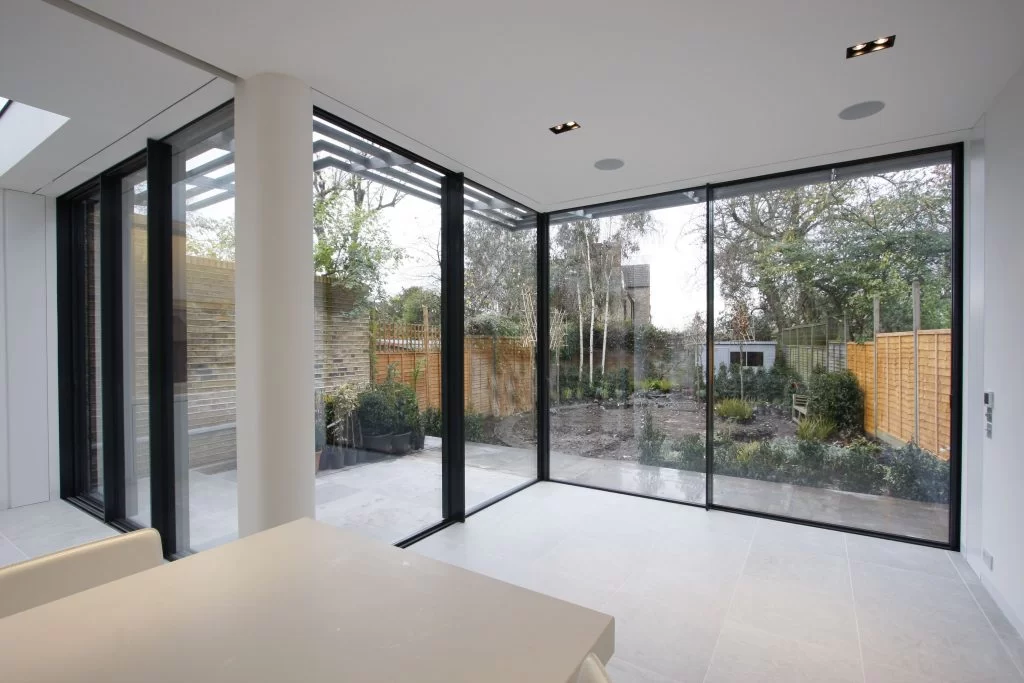Double Glazed Doors
- Home
- Double Glazed
- Double Glazed Doors
What is a Double Glazed Door?
Double glazed doors are made up of two glass panes sandwiched together with a spacer in between. The space between the two panes is filled with argon gas, providing an energy-efficient benefit of significantly reducing hot and cold temperature transfer.
As the door unit is vacuum sealed, this low-maintenance addition does not require refilling throughout the door’s life. Our double glazed doors come with either Aluminium Frames or Thermally Broken Aluminium to suit your needs. Ask us to show you the differences.

Benefits of Double Glazed Doors
Experience the luxury and comfort of modern high-tech buildings right in your home.
More comfort
The energy efficiency provided with double glazed doors reduces your need for air conditioning or heating to maintain the temperature of your home. You feel comfortable throughout the year. The outside environment becomes part of your home, and you realise you are a part of nature.
Peace and calmness
Double glazed doors add to that comfortable feeling right where you live. The double-glazing technology adds harmony and calmness and invites the environment to blend as one. The ambient temperature adds to the atmosphere of your home or office so you can dwell in comfort.
Be cooler in summer and warmer in winter
The sealed air gap between the double-glazing panes is an added insulation layer. It is more energy efficient and reduces heat from escaping in winter, so your home is kept at a comfortable temperature. Double glazing has the reverse effect in summer by preventing unwanted heat from entering the house.
When you are nearby a door, your comfort is affected by the temperature of the glass. With double glazing, the unwanted outside temperature doesn’t transfer through, leaving the inside pane close to room temperature.
Save money
Use up to 80% less heating and cooling. The extra insulation provided by double glazing reduces your reliance on artificial heaters and air conditioners and ultimately reduces your energy costs.
Everything is quiet
Double glazed doors are not only energy efficient but also minimise noise. Sealed double glazing reduces medium to high-frequency noise, such as the human voice. Selecting from a choice of glass thickness between the inner and outer panes improves sound reduction even further.
Reduce condensation and mould
Have you ever noticed how in the middle of winter, your glass doors and windows are wet on the inside? This occurs because of the difference between the heat in your home and the cold outside. The beauty of double glazing is that it also reduces condensation, which often results in unhealthy mould.
Double glazing is tough
The two layers of glass are a minimum of 5mm toughened glass, and the argon gas filling acts as a cushion if something or someone hits the outer glass, which makes it far harder to break. You can specify toughened or laminated glass or add Stainless Steel Security Screens to keep you even safer.
Double Glazed Doors Specifications
Space between panes
For those looking to maximise energy efficiency and optimise thermal performance from your double glazing, 12 mm is recommended.
However, if you aim to reduce noise, such as traffic or aircraft, the optimum air gap is 100mm. The trade-off is that a larger gap means less insulating performance.
Choose double glazing with a space of 10 to 20mm between the panes for better energy-efficient performance,
What’s in between?
The space between the panes in double glazed doors is fully sealed and acts as an insulator, limiting the transfer of cold air into your home.
The thermal and acoustic performance increases when gas is added to this space. Argon is the most popular of gases used as it has low conductivity properties and is a thousand times better than air for insulation.
Inert, low-conductivity gas inserted between panes will increase performance.
Each double glazed unit includes a metal or polymer strip spacer that separates the two glass panes. Usually, the spacer contains a drying agent (desiccant) to remove moisture trapped in the air space.
Glass options
A selection of glass used in double glazed doors can further increase energy efficiency and manage noise control. For instance, Low-E glass will help reduce the amount of heat escaping, while thicker laminated panes disrupt sound waves to improve acoustic performance.
Frame options
The material you choose to frame your glass can enhance the energy-efficient properties of double glazing. Thermally broken aluminium double glazed door frames ensure that the insulation provided by the double glazing is continued throughout the frame.
There are many options and variables for selecting the right double glazed doors. At Energy Saving Windows and Doors, talk to us about the following:
Sliding and Stacking Doors
Entry Doors
Bifold Doors
Laundry Combination

